
|
|
MALI
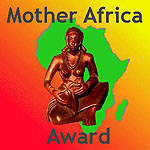
|
|
|
|

|
|
|
Official Name
|
République du Mali
|
|
Located
|
West: Mauritania, Algeria, Senegal, Guinea
|
|
Capital
|
Bamako
|
|
Head of State |
President Amadou Toumani Toure (ATT)
|
|
Area
|
1,240,140 sq km
|
|
Population
|
11.2 million
|
|
Growth rate
|
3.2%
|
|
Language
|
French, Bambara, Songhaï, Tuareg & Arabic
|
|
Currency
|
West African CFA franc
|
|
GNP per capita
|
$550
|
|
Inflation
|
2%!
|
Airlines
(advertise here)
|
from Europe:
from Asia: ________________
from USA: ________________
|
Hotels
(advertise here)
|
Names & Rates per night
______________________
______________________
|
|
USAfrica Agent
|
Afripromo/Conakry
|
|
Country Advertiser
|

|
|
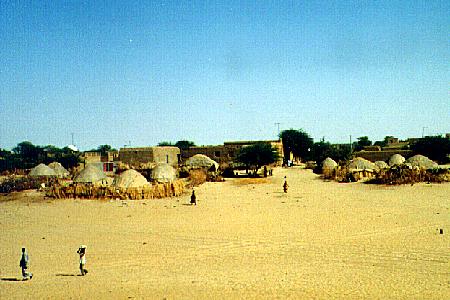
Timbuktu
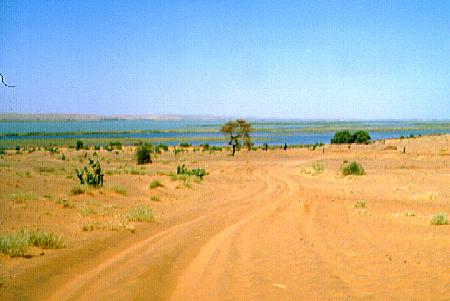
|
|
Mali was one of the greatest states in the world of its time, but is now one of the poorest countries on earth.
Timbuktu has been a magnet for travelers for many years. Le Main de Fatma is a giant rock formation bursting out
of the ground like an enormous hand near Hombori village 250 km southwest of Gao, and is featured on many tourist
posters. This offers the best technical rock climbing in West Africa (some say the world). Halfway up the cliff
is the original village of Teli, one of a score of such places where the Dogons retreated 700 years ago. When the
Dogons arrived, many of these easily defended sites were already occupied by the Tellem people of which little known
except that they were excellent climbers and of small stature.
|
Mali is the heir to a great historical tradition. A series of powerful empires carried this name in the past,
even though not all fell within the present borders of the country. MANSA KANKAN MUSA - EMPEROR OF MALI was one
of the most renowned of all the monarchs of the old Sudan. The Emperor claimed that the length of his realm was
"about one year". The high point of the empire occurred in the 16th century thanks to a very busy gold trade.
France found it hard and long to conquer Mali, and the army had to engage a full scale war which lasted 15 years
to overcome the resistence of the last tribes.
Tourism:
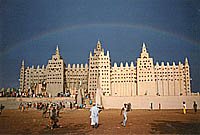
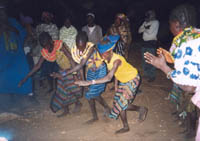
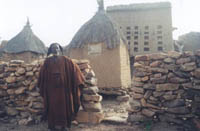
|
|
Mali is one of the best-known countries in West Africa. The country owes this to the legendary names of Timbuktu,
Segou, Djenné and the Dogon people. The ancient commercial towns like Segou, Djenné, Mopti and Timbuktu owed their
prosperity for a great deal to the important Niger River. Although Mali is now one of the poorest countries in the
world, you can still see why the first European explorers were so impressed by the richness and diversity of these
cities. Up to today a mixture of populations from all over the region inhabit these towns. Whereas in these river
towns, people from all over the region of West Africa met each other, the Dogon lived an introvert and retired live.
For ages, they withstood the Islam and other influences from outside. Visiting the Dogon Escarpment, with its small,
clinging villages, you will learn about the live, culture, religion and art of these unique people.
|
Economy:
Since mid-1992 the Malian authorities have implemented an ambitious adjustment program designed to achieve
sustained economic growth and move Mali to financial viability over the medium term. Overall, under the 1992-95
economic program, Mali made considerable progress in reducing financial imbalances and liberalizing its economic
growth. Progress in implementing reforms in the social sectors has been relatively slow and access to social
services improved only marginally. Mali has an important agricultural potential (cotton, rice and cereals,
livestock). Mali has recently become the leading producer and exporter of cotton fiber in sub-Saharan Africa,
with production more than doubling since the devaluation of the CFA franc in 1994. However, significantly lower
production prospects are expected in 2000/01. Production of paddy rice in the Office du Niger zone has
increased by a factor of five over the last 15 years. Livestock export to neighboring countries are now more
competitive and local rice is now able to compete with imports from Asia without recourse to excessively high
levels of protection. The Niger river has large irrigation potential, and the Senegal river (Manantali) has
important hydro-power potential. Of gold, phosphate, diamonds and copper deposits, only gold and phosphate are
currently exploited. Indications of expansion in industrial activity are encouraging (cottonseed oil, textiles,
vegetable oil).
History:
The territory of Mali has been the center of great Empires, the Ghana Empire whose zenith came in 950 to 1050,
the Mali Empire, 1230 to 1320 and the Songhai Empire, 1460 to 1530. In the 17th and 18th centuries, several small
states developed along the Niger basin but they fell during the mid 19th century holy war waged by the Muslim
leader al-Hajj Umar, whose theocratic Tukulor Empire extended from Timbuktu to the headwaters of the Niger and
Sénégal. His son and successor, Ahmadu, was defeated by the French in 1893.
After a short-lived federation with Senegal, the independent Republic of Mali was established in 1960 under
President Modibo Keita, Mali was a one-party state under its President Modibo Keita who led the country on a
path of socialism, with heavy emphasis on the role of the public sector in the economy. Following a 1968 coup,
Moussa Traoré ruled until his overthrow in 1991. The 1992 democratic elections ushered in the Third Republic
under President Alpha O. Konaré. The last 9 years have witnessed a profound political change in Mali. Mr.
Konaré's government has sought to find a balance between restoring the authority of the state (considerably
weakened in the face of growing power of several interest groups) and continuing to promote the democratization
process. In the process, there have been four Government reshuffles since June 1992, the latest one in February
2000. The legislative election in August 1997 produced a parliament composed of ADEMA (the party of President
Konaré) and its allies. Mali's electoral period, which lasted from April 1997 to June 1999, is now over. With
the municipal elections for the last 682 communes, which took place this June, the process of decentralization
can now begin. The next presidential elections are due in 2002.
Enabling us to improve the quality of the content, if you have additonal information, remarks or suggestions,
please share it with us by e-mail.
BAMAKO, 14 May 2002: New President: Amadou Toumani Toure. Amadou Toumani Toure is elected as new president
of Mali simply called "ATT". In the run-off poll on 12 May, ATT received 64.35% of the vote. Mr. Toure is 53 years
old and has held the office before - from 26 March 1991 until 8 June 1992. Few people pretend to know much about the
man behind the hero image, the myth and the genial smile. Mr. Toure has been very low-key and cautious throughout
the electoral period, avoiding bravado and any predictions about his victory or about how he will fare as president.
In 1992 he became president after staging a coup to topple General Moussa Traore. That coup ended a 23 years
heavy-handed military rule. After leading the country through a transition year and into multi-party elections,
Mr Toure handed over power to newly elected President Alpha Oumar Konare. In October 2001 he took early retirement
from the army to enter the presidential race. To many Malians Mr. Toure is a hero in his own lifetime, he has a
reputation internationally for his peace-keeping work with the United Nations, and he has money. He's got a Foundation
for Children, he does vaccinations and fights guinea worm, and many see him as a humanitarian. Mr. Toure is an
ambitious man and he has no inferiority complex. He is full of contradictions. He can be shocked by misery, without
seeing that he's part of the system that causes that misery. Laudable accomplishments in African peace-keeping and
humanitarian work with Jimmy Carter, his many awards from all over Africa, and his elite military training in the
former Soviet Union and also in France. Mr. ATT will have to learn how to handle the power he has been granted by
Malian voters, even as he tries to live up to his reputation as a hero.
BAMAKO, 8 October 2001: Mali has launched an international tender in an effort to open its state-run
telecommunications sector to private operators. The call for bids is aimed at granting companies a license
to establish and operate telecommunications networks in the west African country, according to a government
statement. The license will be granted for a 15-year period, and would be valid for both fixed-line and mobile
telephone networks, the statement said, adding that the bidding process would be completely transparent. In 1998,
Mali had nearly 27,000 phone lines, or 2.5 for every 1,000 inhabitants.
|

